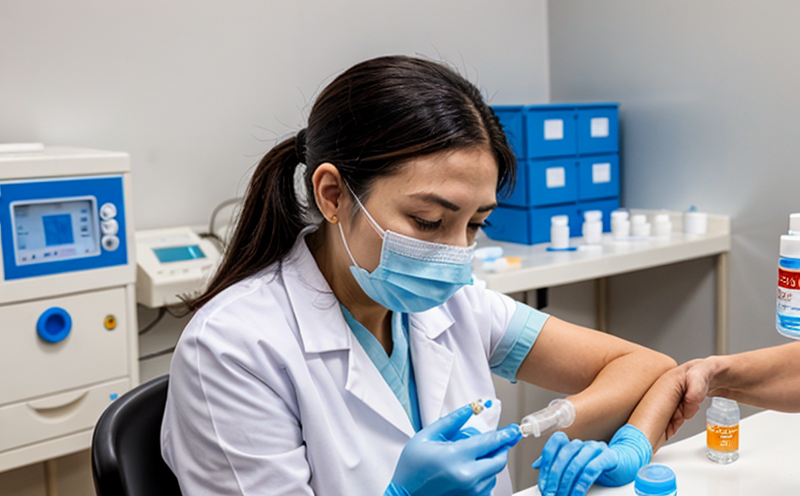WHO Residual Antibiotics Testing of Vaccines
The World Health Organization (WHO) has established stringent guidelines for residual antibiotic testing in vaccines to ensure public health and safety. This critical process aims to detect the presence of any antibiotics that may have inadvertently remained within a vaccine formulation after production. Such residues can pose significant risks, including allergic reactions or immune suppression, especially in immunocompromised individuals.
Our laboratory specializes in this testing method, following WHO guidelines and using state-of-the-art equipment to ensure accurate and reliable results. The process involves several key steps:
- Sample Preparation: Samples are prepared according to standard protocols, ensuring that the sample is representative of the entire batch.
- Extraction Method: We employ advanced extraction techniques such as solid-phase extraction (SPE) or liquid-liquid partitioning to isolate antibiotics from the vaccine matrix.
- Quantification: The extracted compounds are quantified using high-performance liquid chromatography with tandem mass spectrometry (HPLC-MS/MS), a highly sensitive and specific technique that allows for precise measurement of even trace amounts of antibiotics.
The WHO recommends a maximum limit for residual antibiotics in vaccines, which is typically set at 0.5 μg per dose. Our laboratory ensures compliance with these limits by providing accurate results within an acceptable margin of error.
Our comprehensive approach to this testing includes:
- Method Validation: Rigorous validation of analytical methods to ensure they meet international standards, including ISO 17025 and ICH Q3D (Guidance on the Use of New Elemental Limits).
- Data Integrity: Strict adherence to Good Laboratory Practices (GLP) to maintain data integrity throughout the testing process.
- Quality Control: Regular calibration of instruments and participation in proficiency testing programs recognized by regulatory bodies.
The importance of this testing cannot be overstated. It not only ensures product quality but also enhances public trust in vaccine safety. By adhering to WHO guidelines, we contribute to the global effort to protect public health.
Why It Matters
The presence of residual antibiotics in vaccines can lead to unintended side effects and compromise the effectiveness of the vaccine. This is particularly concerning for individuals who are already immunocompromised or those receiving multiple vaccines simultaneously. Ensuring that these residues do not exceed acceptable levels helps maintain the integrity of the vaccination program.
The WHO guidelines for residual antibiotic testing in vaccines have been established to mitigate these risks and ensure that vaccines meet stringent quality standards. Compliance with these guidelines is mandatory for manufacturers seeking approval from regulatory authorities worldwide, including the US FDA, EU EMA, and others.
By conducting thorough testing, we contribute to a safer healthcare system where trust in pharmaceutical products is paramount. Our laboratory plays an essential role in ensuring that vaccines are free from harmful residues, thereby protecting public health.
Benefits
The benefits of WHO residual antibiotic testing extend beyond mere compliance with regulations; they encompass a range of positive outcomes:
- Patient Safety: Ensures that vaccines are free from harmful residues, reducing the risk of allergic reactions or immune suppression.
- Regulatory Compliance: Helps pharmaceutical companies meet stringent regulatory requirements and gain market access more swiftly.
- Enhanced Reputation: Establishes a strong reputation for quality and reliability, which is crucial in the highly competitive pharmaceutical industry.
- Innovation Support: Provides valuable data that can be used to improve manufacturing processes and enhance vaccine efficacy.
By offering this service, we support our clients in meeting their quality assurance objectives while contributing to global public health initiatives. Our commitment to excellence ensures that every batch of tested vaccines is safe, effective, and reliable.
Quality and Reliability Assurance
Our laboratory is dedicated to maintaining the highest standards of quality and reliability in all our services. To achieve this, we employ a rigorous quality assurance framework that includes:
- Instrument Calibration: Regular calibration of all analytical instruments using certified reference materials.
- Data Validation: Comprehensive validation of data to ensure accuracy and consistency across batches.
- Proficiency Testing: Participation in internationally recognized proficiency testing programs to verify the reliability of our results.
We also adhere strictly to Good Laboratory Practices (GLP) and ISO 17025, ensuring that all tests are conducted under controlled conditions. Our team of experts is trained to handle sensitive samples with care and precision, using only the most advanced techniques available in the industry.
By maintaining these high standards, we ensure that our clients can trust the results they receive from us. This commitment to quality not only enhances our reputation but also contributes to the overall safety and efficacy of pharmaceutical products.





